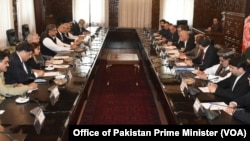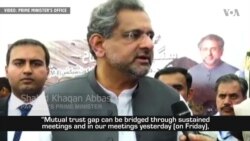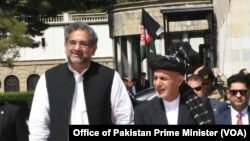Pakistan's prime minister, Shahid Khaqan Abbasi, has said his official meetings with leaders in Afghanistan in the past week have helped narrow a mutual "trust deficit" and the visit will prove to be a "milestone" in promoting regional peace.
Abbasi undertook a day-long visit to Kabul on Friday where his high-level delegation held extensive talks with President Ashraf Ghani and other senior leaders of his government.
The "mutual trust gap can be bridged through sustained meetings and in our meetings yesterday (Friday), we have been able to narrow the trust deficit to a large extent," Abbasi told reporters Saturday.
"We now have to practically prove that we are sincere to the people and to the peace and prosperity of this region," he added.
The Pakistani prime minister said in his "frank and open" discussions with Afghan leaders, both sides have agreed to jointly work toward ending the war in Afghanistan through peace talks rather than focusing on military means.
Abbasi also emphasized the solution to the war in Afghanistan lies in an intra-Afghan dialogue and "we all should help them" in bringing peace to their country.
"We are hopeful that this visit, God willing, will prove to be a milestone in Pakistan-Afghanistan relations and in promoting regional peace."
After Friday's high-level talks in Kabul, both countries jointly urged the Taliban to respond positively to President Ghani's recent offer of unconditional peace talks without further delay.
Ghani's initiative has received widespread domestic and international backing, but the Taliban has avoided commenting on the offer.
Afghan and U.S. officials have long alleged Taliban leaders are sheltering in Pakistan and covertly receive support from the country's security institutions, charges Islamabad rejects as baseless.
There was also no immediate Taliban reaction available to Friday's joint call for the rebels to join the Afghan peace process.
Pakistani and Afghan officials said the meetings between Abbasi and Ghani were held in "a very cordial and friendly atmosphere."
Both leaders "agreed on achieving the common aim of regional security through connectivity" — meaning road, rail, trade and transit links, as well as importing natural gas and power to Pakistan through Afghanistan from resource-rich Central Asian states.
Prime Minister Abbasi extended an invitation to President Ghani to visit Pakistan "at his earliest convenience."
Officials said that progress on the construction of a multi-billion-dollar pipeline to transport natural gas from Turkmenistan to Pakistan and India through Afghanistan, known as TAPI, also was reviewed.
The two countries have also agreed to further an Islamabad-proposed plan for a comprehensive bilateral dialogue, known as the Afghanistan-Pakistan Action Plan for Peace and Solidarity or APAPPS, for strengthening security, economic, political and counterterrorism cooperation.
Rail and road connectivity projects to boost trade and transit activities between and through the two countries also came under discussion. The Afghan side raised the issue of alleged cross-border violations by Pakistani forces and urged Prime Minister Abbasi to use official channels if his country has concerns with regard to militant activity originating from the Afghan side.
The two nations also agreed to form a joint commission to prepare a timetable and mechanism for the dignified repatriation of nearly 3 million Afghan refugees from Pakistan.
This story was written by VOA's Ayaz Gul in Islamabad.







